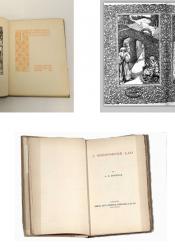A.E., Clemence, and Laurence Housman publish books in same year
The Were-Wolf by Clemence Housman
The Were-Wolf, a gothic novella, was published in 1896 by John Lane at The Bodley Head and Williams and Way in Chicago. This is the first stand alone edition with cover design, title page, and six illustrations by her brother Laurence Housman, engraved on wood by Clemence Housman. It was first published in Atalanta magazine for girls in December 1890. The Were-Wolf was the first of three books written by Clemence Housman, the others being The Unknown Sea (1898) and The Life of Sir Aglovale de Galis (1905). (Hodgkins, Laurence Housman, 1865-1959, Clemence Housman, 1861-1955, Alfred Edward Housman, 1859-1935)
Green Arras by Laurence Housman
Green Arras, a collection of poems, was published in September, 1896 by John Lane at The Bodley Head and Williams and Way in Chicago. The first edition has cover design, illustrations, initial letters, and endpapers designed by Laurence Housman. The dedicatory verse expresses Laurence's gratitiude to his sister Clemence, as the pictures and poems are meant to be a gift to her. The verse goes as follows: "This gift's to the hand of the toiler / To make your name's music be seen / Amid arras of green." This was Laurence's second book, the first being The Writings of William Blake, published in 1893. (Oakley, Inseparable Siblings)
A Shropshire Lad by A.E. Housman
A Shropshire Lad is a collection of poems, published in February, 1896 by Kegan Paul, Trench, Trübner & Co. The first edition printed 500 copies, which quickly sold out. The title page is undecorated with plain type, starkly contrasted to the decorated works of Alfred's siblings. Alfred sent a copy of A Shropshire Lad to Oscar Wilde shortly after his release from prison, which Wilde gratefully received. Alfred Housman is the most famous of the three siblings. To this day A Shropshire Lad has been continuously in print since its first publication. (Hodgkins, Laurence Housman, 1865-1959, Clemence Housman, 1861-1955, Alfred Edward Housman, 1859-1935.)

